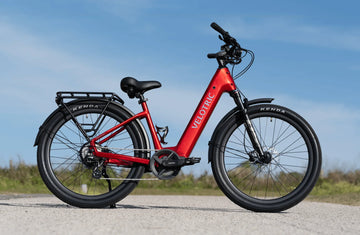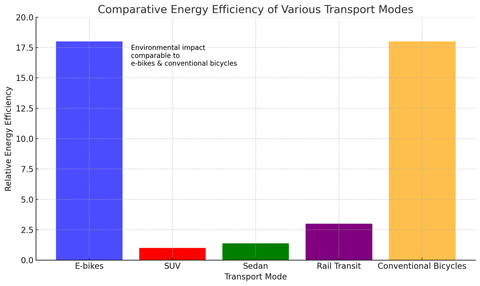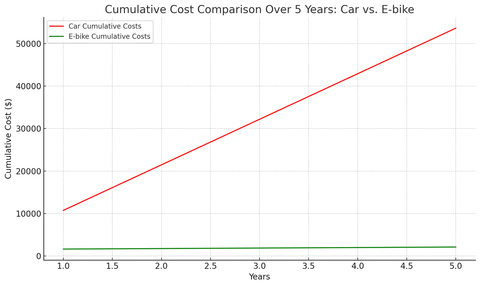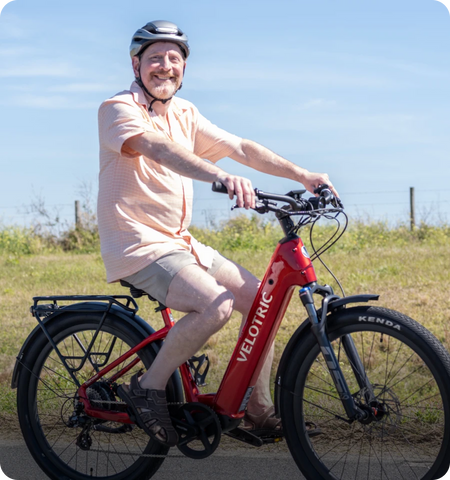Why Should You Need an Ebike?

Keep the Air Clean
Shifting to e-bikes significantly slashes one's carbon emissions. Traditional vehicles, particularly those running on gasoline or diesel, are major contributors to urban smog and global warming due to their substantial CO2 emissions. In stark contrast, e-bikes utilize electricity, which can be derived from renewable sources, fostering a significant reduction in pollutants. This is not just speculation; a 2018 study in England demonstrated that replacing car travel with e-bike usage could reduce car CO2 emissions by up to 50%, equivalent to about 30 million tons annually. Such a transformation is pivotal in urban locales where combating smog and maintaining air quality are ongoing challenges.Furthermore, the environmental benefits of e-bikes are not confined to reducing emissions. Their manufacturing and operation exert considerably less strain on resources compared to automobiles. For example, producing an e-bike demands fewer materials and consumes less energy, thereby easing the pressure on natural resources and shrinking the ecological footprint.
Reflecting on their efficiency, recent research highlighted that e-bikes are 18 times more energy-efficient than an SUV, 13 times more than a sedan, and six times more than rail transit, all while maintaining an environmental impact comparable to that of conventional bicycles.

(Note that The graph's data comes from comparing transport modes to SUVs for energy efficiency. E-bikes and conventional bicycles are marked as 18 times more efficient than SUVs, with sedans and rail transit less so. The efficiency of SUVs is the baseline (1), and other modes' efficiencies are calculated relative to this. This visualization is based on provided comparisons, not precise measurements.)
Coupled with their lightweight and streamlined design, e-bikes exhibit remarkable energy efficiency in operation, further amplifying their environmental benefits. These attributes underscore e-bikes as a viable, sustainable transport option, in line with the increasing global focus on green mobility solutions.
Save More Money
According to AAA, the annual expenses of owning and operating a new car in America - including fuel, maintenance, insurance, taxes, and other related costs - amount to an average of $10,728. This figure reflects the high financial commitment required for car ownership, a significant consideration for anyone evaluating their transportation options.When we dissect the car ownership costs, we find that fuel expenses alone can exceed $1,500 annually in the U.S., a figure that varies with fuel market fluctuations and tends to increase over time. Moreover, car maintenance is another financial burden, requiring hundreds to thousands of dollars each year for services, repairs, and replacements.
Conversely, e-bikes become financially savvy alternatives, with their operating costs dwarfing those of cars. E-bike prices range from a few hundred dollars for basic models to several thousand dollars for high-end versions. For the purposes of comparison, we'll consider an average e-bike purchase price of $1,500, which covers a broad range from entry-level to mid-range models. This price point is chosen to represent a reasonable balance between affordability and quality for most users. Fully charging an e-bike typically costs less than $0.50 and can support a range of 30-70 miles, offering a stark contrast to the $10 to $15 needed to fuel a car for the same distance. Additionally, the simpler mechanics of e-bikes lead to substantially lower maintenance costs compared to cars.

(Also note that the cumulative cost curve graph provides a more intuitive comparison between the long-term costs of car ownership and e-bike usage over a period of 5 years. It clearly shows how the initial investment in an e-bike is quickly offset by the significantly lower annual operating cost, compared to the consistently high annual costs of owning and operating a car. As time progresses, the cost advantage of using an e-bike becomes increasingly evident, highlighting the economic benefits of choosing an e-bike for transportation.)
Insurance premiums further highlight the cost-effectiveness of e-bikes. While car insurance can amount to thousands annually, e-bike insurance-if required-is significantly cheaper, reflecting the lower risks and replacement costs. Moreover, e-bikes eliminate the parking fees that car owners often face, which can amount to hundreds monthly, particularly in city settings.
Incorporating all these factors, the shift from car to e-bike not only supports a more sustainable and health-conscious lifestyle but also offers considerable financial savings. By transitioning to an e-bike, an individual could potentially save thousands of dollars annually, providing a compelling economic argument for considering e-bikes as a primary mode of transportation, especially in urban environments where costs and congestion are highest.
Stay Healthy and Happy
Integrating e-bike riding into daily life serves as a gateway to improved physical activity, which is particularly vital for aged individuals. Unlike traditional bicycles, which may present challenges due to their physical demands, e-bikes offer a less strenuous alternative while still promoting cardiovascular health. This is because e-bikes allow riders to adjust the level of assistance, making it possible to maintain a steady, moderate level of exercise. Such activity is crucial for enhancing mobility and maintaining fitness levels, especially important as one's body ages and requires regular, moderate exercise to stay in shape and prevent ailments.
Moreover, the benefits of e-bike usage extend beyond the physical to the psychological. Engaging in outdoor activities, like riding an e-bike, has been shown to reduce stress and improve mental health. This form of exercise allows individuals to connect with their environment and community, offering a sense of belonging and increased social interaction, which are key components of mental well-being. The combination of physical activity, fresh air, and community engagement contributes to a holistic sense of health and happiness, helping to combat the sedentary lifestyle that is all too common in today's society.

Easy to Use Anywhere
E-bikes design caters to a broad range of users, including those of varying ages and physical capabilities. The adjustable assistance provided by e-bikes means that riders can customize their experience to their physical condition and preferences, thereby removing many of the barriers associated with traditional cycling or other forms of transportation.For those in the older age group, e-bikes offer a practical solution for commuting to work, running daily errands, or simply enjoying leisurely rides without the fatigue associated with conventional bikes. Additionally, the efficiency of e-bikes in urban environments cannot be overstated. Riders can often bypass traffic congestion using bike lanes, reducing commute times and avoiding the stress associated with traffic jams. This efficiency, combined with the ease of finding parking compared to a car, significantly enhances the overall convenience and accessibility of urban mobility.
Furthermore, e-bikes open up new opportunities for those who may have been hesitant to cycle due to hills, distance, or physical fitness concerns. This new-found accessibility can transform daily routines, offering a more enjoyable and flexible alternative to traditional transportation methods. By improving accessibility, e-bikes empower a broader demographic to embrace a more active and independent lifestyle, thereby fostering a greater sense of freedom and satisfaction in their daily lives.
No More Traffic Stress
The daily commute, particularly in densely populated urban areas, often proves to be a major stressor, contributing significantly to the day's anxiety and discomfort. The typical urban commuter contends with congested roads, unpredictable delays, and the general chaos associated with peak travel times. However, the advent of e-bikes introduces a viable solution to this pervasive issue. By leveraging the nimbleness and efficiency of e-bikes, commuters can bypass the gridlocked streets, opting instead for clearer, more serene bike lanes and paths. This alternative route not only circumvents the primary sources of congestion but also considerably shortens the commute time, transforming a typically stressful journey into a more relaxed and enjoyable experience.Get Cash Back From Government Incentives
Governments are recognizing e-bikes' environmental and health benefits by offering various incentives to promote their adoption. In 2023, Minnesota launched a significant initiative within its $7.8 billion transportation package, setting aside $4 million for a rebate program that helps cover the cost of new e-bikes and safety accessories, with savings up to $1,500 based on income. Importantly, 40% of these rebates are aimed at individuals earning under $41,000, broadening access to sustainable transportation.Similarly, in late 2023, California started the E-Bike Incentive Project, which, by the way, is only accepting retailer applications and now targets lower-income residents, offering vouchers redeemable at certified retailers for up to $2,000 off e-bike purchases. Priority is given to those from disadvantaged communities or earning below 225% of the Federal Poverty Level. The project has dedicated $13 million to support this initiative, underlining a commitment to making e-bikes accessible and fostering safer cycling environments through mandatory safety training.
These initiatives illustrate the concerted effort to make e-bikes more affordable and accessible, encouraging a shift towards more sustainable urban mobility solutions.
E-bikes cut down on pollution, save you money on fuel and parking, and give you a great way to stay fit. They're perfect for today's city life, where we all want to do our bit for the planet while keeping life easy and enjoyable. So, whether you're heading to work, getting some exercise, or just out for a ride, e-bikes offer a fantastic way to make your daily journey better in every way.

